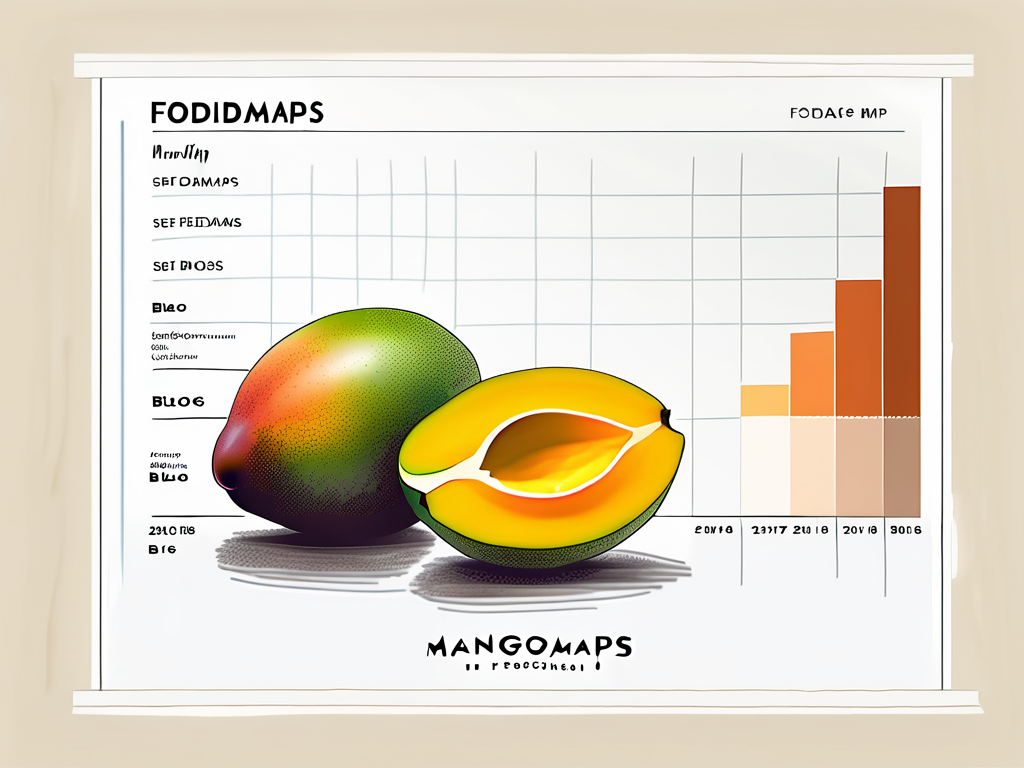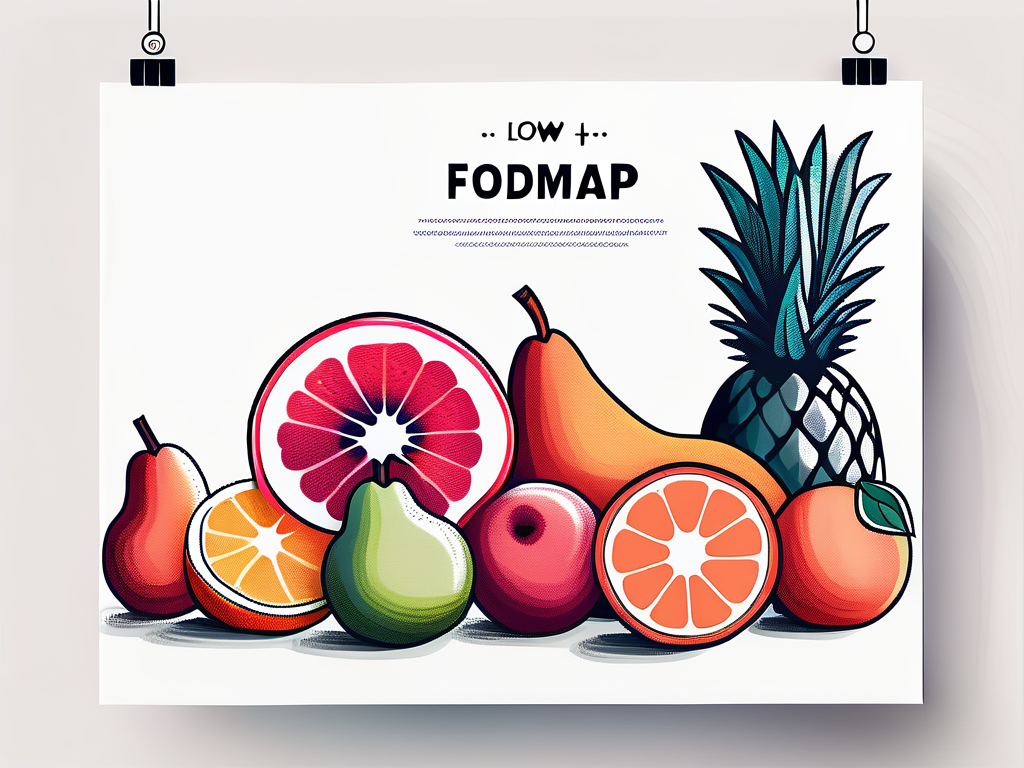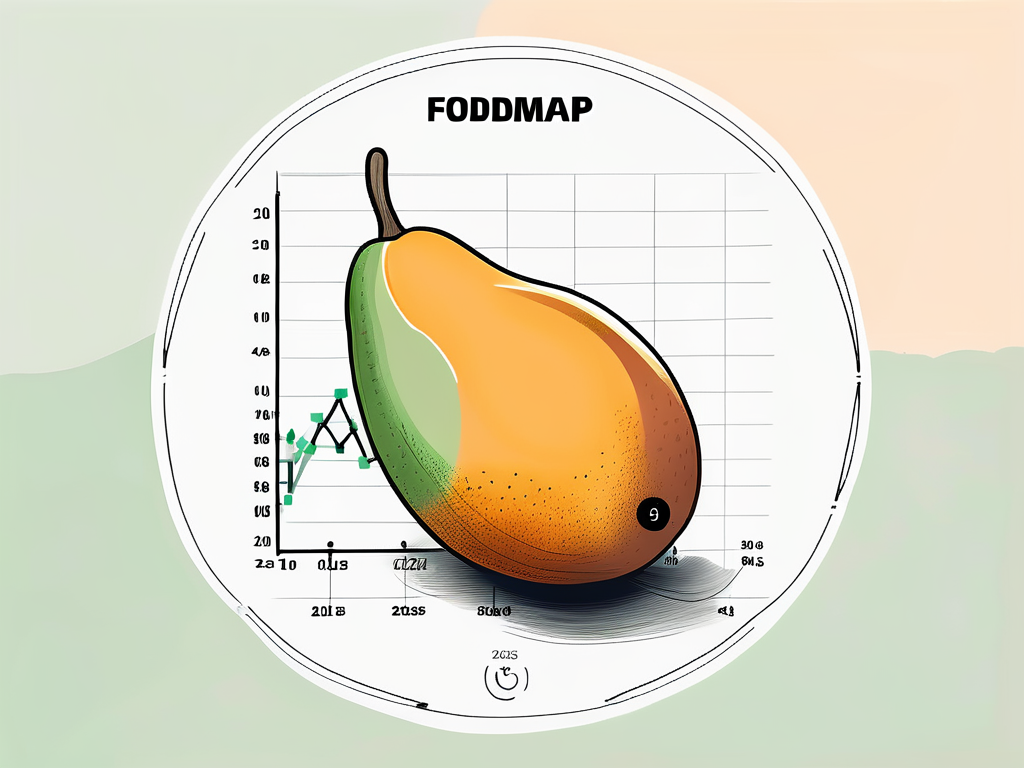Mango is a delicious and popular tropical fruit that is loved by many. However, for individuals following a low FODMAP diet, the question arises - is mango a low FODMAP food? To answer this question, we need to understand what FODMAPs are and why low FODMAP foods are important.
Understanding FODMAPs
FODMAPs are a group of short-chain carbohydrates that can be poorly absorbed in the small intestine. The term "FODMAP" stands for fermentable oligosaccharides, disaccharides, monosaccharides, and polyols. These carbohydrates can cause digestive issues such as bloating, gas, and abdominal pain in some individuals, especially those with irritable bowel syndrome (IBS).
It's important to note that FODMAPs are not inherently bad for everyone. They are only problematic for those who have a sensitivity or intolerance to them. For these individuals, following a low FODMAP diet can help alleviate digestive symptoms and improve overall gut health.
What are FODMAPs?
FODMAPs are found in a wide variety of foods, including fruits, vegetables, grains, dairy products, and sweeteners. Some common examples of FODMAPs include:
- Oligosaccharides: Fructans and galacto-oligosaccharides (GOS)
- Disaccharides: Lactose
- Monosaccharides: Fructose (in excess of glucose)
- Polyols: Sorbitol, mannitol, xylitol, and maltitol
These carbohydrates can ferment in the gut and draw in water, leading to symptoms like bloating and diarrhea in susceptible individuals.
Why are Low FODMAP Foods Important?
For individuals with IBS or other digestive disorders, consuming high FODMAP foods can trigger unpleasant symptoms and discomfort. Therefore, identifying and reducing or eliminating these foods from the diet can make a significant difference in managing digestive symptoms and improving quality of life.
A low FODMAP diet is an approach that involves restricting high FODMAP foods for a certain period of time and then gradually reintroducing them to identify individual triggers. It is not meant to be a long-term solution but rather a diagnostic tool to pinpoint specific intolerances.
When following a low FODMAP diet, it's important to understand that not all high FODMAP foods need to be completely eliminated forever. In fact, many individuals find that they can tolerate certain FODMAPs in small amounts without experiencing symptoms. This is because the threshold for triggering symptoms varies from person to person.
Additionally, it's worth noting that FODMAPs are not the sole cause of digestive issues. Other factors such as stress, lack of physical activity, and certain medications can also contribute to symptoms. Therefore, it's important to take a holistic approach to managing digestive health and consider all possible factors.
The Nutritional Profile of Mangoes
Now that we've covered the basics of FODMAPs and their significance, let's delve into the nutritional profile of mangoes. Mangoes are not only delicious but also packed with essential nutrients that offer various health benefits.
Mangoes, scientifically known as Mangifera indica, belong to the Anacardiaceae family, which also includes cashews and pistachios. These tropical fruits are native to South Asia but are now cultivated in various regions around the world, including India, Thailand, and the Philippines.
Key Nutrients in Mangoes
Mangoes are an excellent source of vitamin C, providing a significant portion of the recommended daily intake. Vitamin C is a potent antioxidant that helps boost the immune system and protect against oxidative stress. In fact, just one cup of sliced mangoes can provide up to 60% of the daily value for vitamin C.
In addition to vitamin C, mangoes are also rich in vitamin A, which is important for maintaining healthy vision, skin, and immune function. They also contain dietary fiber, which aids in digestion and supports a healthy gut. A medium-sized mango can contain about 3 grams of fiber, contributing to overall digestive health.
Health Benefits of Mangoes
Consuming mangoes has been associated with several health benefits. They are known to be a good source of antioxidants, which help fight inflammation and protect against chronic diseases. The combination of vitamin C, vitamin A, and various phytochemicals in mangoes makes them a powerhouse of nutrition.
Mangoes also contain phytochemicals such as mangiferin and quercetin, which have been linked to potential anti-cancer properties and may help prevent certain types of cancer. These compounds work synergistically with other nutrients in mangoes to promote overall health and well-being.
Furthermore, mangoes have a low glycemic index, which means they have a minimal impact on blood sugar levels when consumed in moderation. This makes them a suitable choice for individuals with diabetes or those aiming to manage their blood sugar levels. The natural sugars in mangoes are balanced by the fiber content, helping to prevent spikes in blood glucose levels.
Mangoes and FODMAPs
Now, let's address the pressing question - do mangoes contain high levels of FODMAPs?

Mangoes, often hailed for their sweet and tropical flavor, are not only a delicious fruit but also a great option for individuals following a low FODMAP diet. These juicy fruits are considered low in FODMAPs, making them generally well-tolerated by those with sensitive digestive systems. According to Monash University's FODMAP app, mangoes have been classified as low in fructose and sorbitol, two common FODMAPs that can trigger digestive discomfort.
However, it's important to note that while mangoes are low in FODMAPs, portion size plays a crucial role in determining their FODMAP content. Larger portions of mangoes may contain higher levels of FODMAPs, potentially causing symptoms in individuals with FODMAP sensitivities. Therefore, moderation is key when enjoying this tropical fruit.
FODMAP Content in Mangoes
Mangoes are not only a delicious and nutritious fruit but also a great addition to a low FODMAP diet. Their classification as low in fructose and sorbitol by Monash University's FODMAP app makes them a safe choice for individuals looking to manage their FODMAP intake.
Factors Affecting FODMAP Levels in Mangoes
When it comes to FODMAP levels in mangoes, ripeness plays a significant role. Ripe mangoes are generally lower in FODMAPs compared to unripe or overly ripe mangoes. Therefore, selecting ripe mangoes can help minimize the FODMAP content and reduce the likelihood of triggering digestive issues.
Furthermore, the way mangoes are consumed can also impact their FODMAP levels. Enjoying mangoes on their own or pairing them with low FODMAP ingredients is ideal for maintaining a low overall FODMAP load in a meal. Mixing mangoes with high FODMAP foods can elevate the FODMAP content of the dish, potentially causing discomfort for those with FODMAP sensitivities.
How to Include Mango in a Low FODMAP Diet
Now that we know mangoes can be enjoyed on a low FODMAP diet, let's explore how to incorporate them into your meals and snacks.
Mangoes, with their sweet and tropical flavor, can be a delightful addition to your low FODMAP menu. Not only are they delicious, but they also provide essential nutrients such as vitamin C, vitamin A, and fiber, making them a nutritious choice for those following a restricted diet.
Portion Sizes and FODMAPs
According to Monash University, a low FODMAP serving of mango is considered to be approximately 1/4 cup or 46 grams. This portion size is generally well-tolerated by most individuals following a low FODMAP diet.
It's essential to be mindful of portion sizes when enjoying mangoes, especially if you are sensitive to FODMAPs. Gradually increasing the portion size over time can help monitor your tolerance and avoid potential digestive discomfort.
Adding mangoes to your diet in moderation can provide a burst of flavor and nutrients without causing digestive issues, allowing you to savor this tropical fruit without worry.
Preparing Mango for a Low FODMAP Diet
To enjoy mangoes while following a low FODMAP diet, it's important to remove the skin and stick to the recommended portion size. You can slice or dice the mango and incorporate it into various dishes, such as fruit salads, smoothies, or as a topping for yogurt.
Remember to enjoy mangoes in combination with other low FODMAP ingredients to create balanced and flavorsome meals that won't trigger unpleasant symptoms.
Experimenting with different ways to include mangoes in your low FODMAP recipes can add a refreshing twist to your meals, providing both taste and nutritional benefits. Whether blended into a refreshing smoothie or paired with lactose-free yogurt, mangoes can elevate your low FODMAP culinary experience.
Other Low FODMAP Fruits to Consider
If you're on a low FODMAP diet and looking to add more variety to your fruit choices, here are some other low FODMAP fruits you can consider:

List of Low FODMAP Fruits:
- Strawberries
- Blueberries
- Pineapple
- Oranges
- Grapes
- Bananas (ripe)
- Kiwis
- Cantaloupe
- Honeydew melon
- Passion fruit
Comparing Mango with Other Low FODMAP Fruits
When comparing mangoes to other low FODMAP fruits, they offer a unique flavor profile and nutritional composition. While all low FODMAP fruits offer various health benefits, mangoes stand out with their high vitamin C and vitamin A content.
It's always a good idea to incorporate a variety of low FODMAP fruits into your diet to ensure you're getting a wide range of nutrients. Mixing and matching fruits can add excitement and diversity to your meals and snacks while adhering to a low FODMAP plan.
Conclusion
In conclusion, mangoes can be considered a low FODMAP food and are generally well-tolerated by individuals following a low FODMAP diet. They offer a wealth of essential nutrients and health benefits, making them a delicious and nutritious addition to a balanced diet.

As with any food, portion control and individual tolerance are key. It's important to monitor your own body's response and adjust portion sizes accordingly. Incorporating a variety of low FODMAP fruits, including mangoes, can help create a diverse and enjoyable eating experience while supporting digestive health.
So, if you're a fan of mangoes and have been wondering whether you can enjoy them while following a low FODMAP diet, the answer is yes - go ahead and savor the sweetness of this tropical delight!